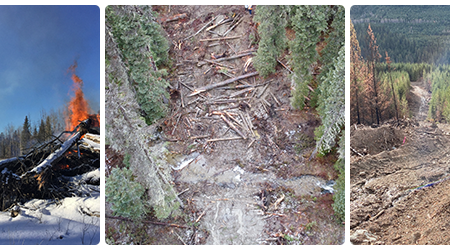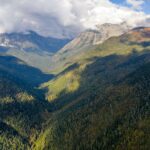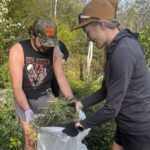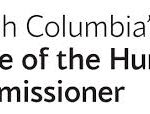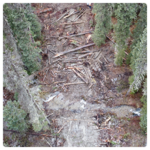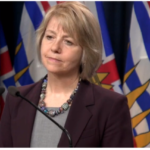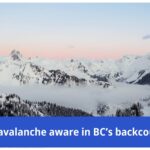Carbon Neutral Kootenays—Darkwoods conservation project may cash in on new climate action payments
A tri-regional partnership has identified the protection of the Darkwoods Conservancy Area as a local project on which to spend “carbon offset purchases,” both supporting a very significant conservation project, and allowing climate action tax dollars collected in the region to stay within the region.
Carbon Neutral Kootenays
Carbon Neutral Kootenays (CNK) is funded by the regional districts of East Kootenay, Central Kootenay, and Kootenay Boundary, in addition to the Columbia Basin Trust (CBT), to identify regional projects in which to invest to reduce carbon emissions by at least the amount of participating local governments’ emissions.
Currently, Kootenay governments spend about $11 million per year on energy and generate about 20,000 tonnes of carbon dioxide. New legislation requires local governments to be “carbon neutral” by 2012, which typically means a combined approach of increasing efficiencies to reduce emissions, and purchasing “carbon offsets” equal to the remaining emissions.
Carbon offsets are investments into projects that specifically and measurably reduce emissions from what they otherwise would be. For two years, CNK has reviewed regional project opportunities and found that only one local project meets the criteria and can be invested in before the deadline of March 8, 2013.
Other public sector organizations, such as the provincial government, schools, hospitals, universities, and crown corporations (including CBT) have been carbon neutral since 2010.
2012 offsets for CNK participants will be purchased from the Nature Conservancy of Canada to manage conservation efforts in the Darkwoods property, and to build an endowment to sustain a 100-year management and conservation plan for the area.
Negotiations for pricing Darkwoods’ carbon offsets have not been finalized, but $25/tonne has been suggested by CNK as an upper limit. Calculations will not be complete until all participating local governments have submitted their emissions numbers, probably before Feb. 28, 2013.
Darkwoods Conservancy
The Darkwoods is a 136,000 acre property on the west side of the south end of Kootenay Lake owned by the Nature Conservancy of Canada (NCC). It is both the largest private conservation initiative in Canada and the largest forest carbon offset project in North America at this time.
The Darkwoods has a 500 year old stand of western red cedars and is home to 200 animal and 219 plant species, including 19 species at risk. The land connects to an existing network of parks and wildlife management areas totalling 250,000 acres, enough space for animals like the very rare mountain caribou, but also grizzly bears, wolves, cougars, elk, lynx, and moose.
The Darkwoods also contains 50 lakes in 17 large watersheds, protecting the integrity of sites such as the Creston Valley wetlands.
Originally purchased after World War Two by Duke Carl Herzog von Wurttemberg of Germany, the duke eventually wanted to entrust the land to new owners who would keep the Darkwoods intact and protect its ecology. The NCC acquired the property in 2008 from the Pluto Darkwoods Corporation (PDC) who had owned the property since 1967.
Up until 2008, PDC had harvested about 55,000 cubic metres of timber per year in a “conservation-based” forest management plan. The NCC has greatly reduced the historical levels of harvesting, creating the opportunity to use carbon offset purchases to fund the NCC to allow it to maintain these low levels of harvesting.
Council’s reaction in Rossland
Council voted unanimously to participate in the CNK proposal. Rossland has approximately $7000 to spend into the fund, as calculated using the “SmartTool” accounting software to measure the city’s offsets legislated to compensate for not meeting carbon neutral requirements.
Deputy CAO Tracey Butler noted ongoing discussions with Patricia Dehnel of the Community Energy Association as the cost of Darkwoods carbon offsets is finalized.
“Once we know the firm numbers, we’ll be coming back to council,” Butler said.
Coun. Kathy Wallace said, “I certainly support this [Darkwoods project] in principle. It has been a concern of mine that whatever tax dollars we’re paying out to achieve carbon neutrality should stay in the local area as much as possible.”
“Here, the taxpayer can feel some sort of ownership,” she said. “[The money] is to provide a covenant on the [Darkwoods] lands for 100 years, so nothing will be disturbed.”
“In the future, we can use this money towards organic waste diversion,” she added, saying that she thought this would be the best use for carbon offset money.
Mayor Greg Granstrom was not as impressed, calling carbon neutrality legislation “just another tax.” He asked, “Who knows how to be more efficient than people in the municipality?”
Coun. Kathy Moore said she didn’t have a problem with the program that she said charged Rossland “our share.”
“Municipality efficiency would be great,” she said. “If we can get it down to zero, we won’t pay anything.”
“I’m glad to see [this money] stay in the Kootenays,” she added, “and I’m happy to see we can put it towards organic diversion in the future.”
Coun. Jody Blomme asked if the issue should be referred to the Sustainability Commission for recommendations, but the consensus around the table was that the SC would have little to add to what was already known from the reports, and the choice was limited to the options presented.
The report CNK provided to council about the project is attached below.






